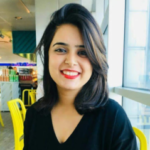To highlight some of Project Cities star students and faculty, PC staff sat down to interview Hussain Farwa. Farwa has worked on two Project Cities projects, one with the City of Peoria and one with the Town of Clarkdale.

Farwa’s first project was the COVID needs assessment for local businesses for the City of Peoria. For this project she worked on a peer community analysis to learn more about what other cities were doing to support local businesses during COVID. For her second project, she worked with the Town of Clarkdale to identify a peer community, Camp Verde, to identify recommendations for affordable housing issues. The following dialogue and summary come from an interview with Farwa about her experience in the Project Cities program.
Question: What does sustainable development mean to you? Of the 17 Sustainable Development Goals, what would be your primary focus and why?
Farwa: “This is a tough question because as an aspiring advocacy planner, I give equal importance to all of the seventeen sustainability goals. However, I do aim to work actively towards reduced inequalities, just cities and communities, climate action and equal economic opportunities. Usually when we talk about sustainability, it is usually in the context of the Global North, but I think of sustainability beyond any geographies especially because everything is so connected.”
Q: What did you learn from this experience?
Farwa: “Firstly, it really helped me get out of my comfort zone and just approach city officials. I never imagined everyone to be so accommodating and always ready to help. I thought that you need to know someone before you contact them. So now whenever I am working on a project, I just email or call for scheduling interviews.
Secondly, project cities really helped with breaking the chain of working on hypothetical projects and is overall very rewarding. By working on real projects, it gives a sense of accountability and accomplishment. Every time, it made me feel that my efforts and work is being appreciated and put to use which is ultimately helping rather than gathering dust.
Lastly, networks. During the process I think I got to make good networking connections as we conducted zoom interviews, and everyone was always ready to help. As an international student, this is of immense importance for me because for someone who has never been to Arizona and has to start networking from scratch, it was a very helpful process in putting my foot in the door.”
Project Cities is a member of the Educational Partnerships for Innovation in Communities Network (EPIC-N) and is administered by ASU’s Julie Ann Wrigley Global Futures Laboratory and the Sustainable Cities Network. Stay up to date with Project Cities and the Sustainable Cities Network by following us on social media or subscribing to our newsletter.